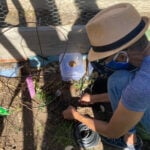A century ago, Los Angeles County was one of the top producing agricultural counties in the nation, with more than 12,000 farms growing a wide assortment of citrus, berry, nut and vegetable crops on more than 200,000 acres of land, according to figures compiled by the Los Angeles Almanac.
Then, as the county was paved over, farms all but disappeared. Since the 1980s, agricultural employment has made up a mere one-tenth of 1% of the total workforce, and farming is done only in some rural communities east of Santa Clarita and in the Antelope Valley.
But in recent years, farming has made somewhat of a comeback – with a twist: the focus now is on urban, sustainable farming technologies. Community gardens have taken root, as has indoor farming. And ag-tech startups are developing advanced soil monitors, biological pest control techniques and other technologies aimed at making farming more sustainable.
“Land is very expensive, and farming is not a high-value product in terms of land use,” said Deepak Rajagopal, a professor at the UCLA Institute of the Environment and Sustainability and director of the Leadership in Sustainability Certificate Program at UCLA. “But with L.A.’s huge population base, it’s suitable for vertical farming and other innovations.”
That’s a major reason why indoor vertical farming companies have set up shop here, most notably South San Francisco-based Plenty Unlimited Inc., which is set to open a vertical farm inside a 95,000-square-foot Compton warehouse later this year. The entire focus of Plenty’s vertical farm is to squeeze out the maximum crop production using a tiny fraction of the water and other resources that a traditional farm requires.
Another, considerably larger indoor farming operation is planned by Beverly Hills-based Bluehouse Greenhouse Inc. in the Antelope Valley. The nearly 3 million-square foot greenhouse is slated for 62 acres of land in Lancaster and is expected to produce 50 million pounds of fruits and vegetables on an annual basis.
The county has also seen the spread of urban community farms, tucked away on small parcels in the middle of dense and often low-income neighborhoods. That’s where one farm entrepreneur, Sabrina Williams, got her start, selling small-scale automated sprinkler systems; her nonprofit company was called SEED.
But with the increased focus these days on sustainable farming practices, Williams and other farm sector entrepreneurs have pivoted to developing new technologies to better monitor carbon content in the soil, keep track of tree canopies and of irrigation trends. Williams formed a new for-profit company to track the amount of carbon in the soil so that community farmers could start cashing in on the carbon offset credit markets.
Another of these entrepreneurs is Bailey Stockdale, chief executive of Claremont-based Leaf International Corp., a farm data company which just raised $5 million to start monitoring soil carbon content and irrigation trends in an effort to make farms more sustainable.
Another local ag tech company is putting a new spin on tackling an old problem: controlling insect pests that plague farms. Pushing aside the traditional pesticide focus for pest control, Santa Monica-based Provivi Inc. is using insect pheromones, or scents, to limit pest populations.
While these companies could develop anywhere, they have chosen Los Angeles County in part because of the talent pool and access to major research institutions, according to Rajagopal.
Bluehouse Greenhouse Inc.

HEADQUARTERS: Beverly Hills
CEO: Ari Kashani
BUSINESS: Developer of technologically advanced greenhouses.
EMPLOYEES: 4
NOTABLE: Will break ground later this year on its first project in Lancaster.
Despite delays in getting his first project off the ground, Ari Kashani is confident about his company, Bluehouse Greenhouse Inc.
The Beverly Hills firm planned to break ground early this year on its large greenhouse in Lancaster. But, Kashani said, there were supply chain issues and development was delayed.
The 62-acre, 2.8 million-square-foot greenhouse center in the Antelope Valley city will now break ground in the third quarter, with the first fruits and vegetables to be harvested about a year later.
The grow center will be able to produce 50 million pounds of sustainably grown produce annually for distribution to local grocery stores and high-end restaurants.
Kashani started the company in late 2017 to use today’s technology and sustainability factors in the agriculture industry.
“I wanted my first facility to be an area where this sustainable method of farming can be showcased and shared with people easily, and Lancaster is the spot for that,” he added.
When it comes to the sustainability of the tomatoes and leafy greens – lettuce, arugula, spinach, and herbs – to be grown in the Lancaster greenhouse, Kashani said it comes down to mainly water. The center will use about 95 percent less water than crops grown in an outdoor field.
Water used in the field gets flooded into the fields or sprinkled onto the plants and relatively little gets to the roots, Kashani explained.
“Meaning that a lot of that water is wasted and not actually absorbed by the crop but absorbed by the soil,” he said.
In the greenhouse, you can directly feed the root of the plant the exact amount of water it needs to consume at that moment, he continued.
“The remaining runoff is captured in our system, creating a closed loop environment where the water is constantly being recirculated and the crop is only absorbing the amount of water that it needs as opposed to any water being wasted by percolating into the ground or not being consumed by the crop,” Kashani added.
Another sustainability factor, the company faces is making sure the crops are free of chemicals or pesticides, Kashani said, adding, “We do that using a closed greenhouse, ensuring the cleanest and safest environments for the plant.”
– Mark R. Madler
Leaf International Corp. (dba: Leaf Agriculture)

HEADQUARTERS: Claremont
YEAR FOUNDED: 2019
BUSINESS: Data and data platform provider to farm industry suppliers and other companies serving farmers all aimed at maximizing crop output
CEO: Bailey Stockdale
EMPLOYEES: 37
FUNDING TO DATE: $7.3 million
NOTABLE: Leaf is using recent $5 million raise to further invest in data gathering to support sustainable farming activities, including soil irrigation and carbon content.
When Bailey Stockdale was a teenager growing up in Southern California a decade ago, he would pay frequent visits to his family’s farm in Illinois. A child of the digital age, he was amazed at the persistence of old school manual techniques that farm manger used to measure soil temperature and moisture.
“Decisions on when to plant and how much to plant were still being done on an instinctual basis,” Stockdale said.
He then made it his mission to help bring farming into the full digital age, thereby making it easier to ensure the sustainability of farms.
Stockdale had an opportunity to start putting this mission into practice shortly after graduating college when he was an independent consultant in Brazil selling aerial imagery to farmers. He teamed up with a software manager there, Luis Santana, to found a company that would supply aerial imagery and other standardized data sets to farmers, their suppliers and others servicing the farm industry. And so, three years ago, Leaf Agriculture was born.
For the first 18 months, the focus was primarily on helping farmers and their suppliers better time their seed planting, as well as getting loans.
But over the past year, Leaf has been pivoting to carbon and sustainability management, using its aerial imagery to help farmers monitor environmental conditions, tree/plant canopies, and especially whether regenerative practices the farmers adopt actually rebuild organic matter within the soil, which is one of the key techniques of sustainable farming.
Stockdale said that Leaf doesn’t actually produce the images; rather, it takes the images and then applies technology to present the images in standardized form so they can be used to compare different geographical farm operations and changing conditions on the same farms over time.
According to Leaf’s website, the imagery is not just what’s visible to the human eye but also across different wavelengths of the electromagnetic spectrum, especially infrared – or thermal – imaging.
To further this effort, Leaf last month closed a $5 million funding round that will enable it to start monitoring irrigation trends and soil carbon content, as well as weather data in the vicinity of individual farms.
“There’s a tremendous gap with localized weather stations,” Stockdale said.
Besides helping farmers, the weather data can be used to fill in gaps in understanding of climate change’s impact at the very local level.
– Howard Fine
SEED: Sustainable Entrepreneurial Ecosystem Development

HEADQUARTERS: Downtown Los Angeles (a Los Angeles Cleantech Incubator portfolio company)
YEAR FOUNDED: 2010 as nonprofit; 2019 became for-profit B-Corp
BUSINESS: Developed carbon sensor to measure amount carbon stored in soil; customers use the carbon content figure to help small/urban farm customers obtain carbon offset credits.
CEO: Sabrina Williams
EMPLOYEES: 4
FUNDING TO DATE: $75,000 (in midst of another funding round with $300,000 target)
NOTABLE: SEED’s first product was an automated irrigation system; company set this product aside to focus on carbon content sensor.
Downtown L.A.-based SEED has its roots as a nonprofit helping urban dwellers plant community gardens. SEED, which stands for Sustainable Entrepreneurial Ecosystem Development, was focused on helping public housing residents grow more of their own food as a way of reducing food insecurity, according to founder Sabrina Williams.
SEED’s first product nearly a decade ago was an automated irrigation system developed to help public housing residents gain better control over how much water to use in gardening and cultivating urban farm crops. These irrigation kits, which retail for about $75, were distributed free or at a price of under $5 to public housing and other low-income residents.
But, Williams said, the company was having difficulty finding customers willing to pay the price to support the nonprofit side of the business.
Instead, she she saw an opportunity in a completely unexpected direction: developing software to convert data collected by carbon sensors in the soil into a format compatible with carbon credit offset markets such as the “cap and trade” program in California. The goal: to accurately represent how much carbon was being stored in the soil through regenerative planting practices (such as composting) and conveying that figure in standardized format to the carbon credit offset markets.
“The big farm operations had been doing this for 10 or 20 years,” Williams said. “But the low-income housing resident using a community farm completely lacked the knowledge or the tools to do this.”
As a result, she said, low-income urban farmers were completely missing out on opportunities to monetize any of their practices that lead to increasing soil carbon content. In essence, she said, these farmers were putting carbon into the soil, but carbon emitters didn’t know about it and so couldn’t pay the farmers for the use of the carbon credits they were generating.
Williams teamed up with the downtown-based Los Angeles Cleantech Incubator to develop the software to tie into the carbon sensors.
In 2019, Williams converted SEED from a nonprofit to a for-profit company. She said the carbon sensor software is in beta-testing, with the aim of going live later this year.
– Howard Fine
Provivi inc.

HEADQUARTERS: Santa Monica
YEAR FOUNDED: 2014
BUSINESS: Develops and supplies pheromones to farmers to control insect pest populations
CEO: Pedro Coelho
EMPLOYEES: 173
FUNDING TO DATE: $170 million
NOTABLE: Two of Provivi’s co-founders and six other key executives are from Pasadena-based Caltech.
For the better part of a century, farmers’ main weapon against insect pests that destroy their crops has been pesticides, which also have widespread toxic impacts on the soil, air and water. There have also been efforts introduce sterile insects into the mating pools of insect pests – most notably with fruit flies.
Santa Monica-based Provivi Inc. has come up with a relatively new biological weapon against pests, using pheromones, which are scents that insects and other fauna use to attract mates. The idea is simple: by covering farms with pheromones, the insect pests – usually males – get confused and can’t find a mate.
Like other biological weapons against pests, pheromones are non-toxic, making them more suitable for sustainable agriculture.
“It’s preventative – and it doesn’t kill the pests or anything else,” said Provivi co-founder and Chief Executive Pedro Coelho.
While pheromones as a pest control tool have been around for decades, they have until recently been so expensive to produce that only farmers of high-margin crops could afford to use them, Coelho said.
“We came in and found ways to produce pheromones more cheaply,” Coelho said, referencing his team of fellow Caltech faculty and graduates who helped found the company back in 2020.
Specifically, he said, the team licensed technologies from other companies affiliated with Caltech and developed synthetic pheromones.
Early on, Provivi focused on a species of worm known as the fall armyworm, which has destroyed rice crops in Asia.
A major challenge from the outset, Coelho said, was proving that the pheromones actually worked to reduce insect pest populations, thereby boosting crop yields. That involved going through many rounds of trials.
As those trials were going on, the fall armyworm expanded its territory, leaving tons of destroyed crops in its wake. “As a result, we were following the pest,” Coelho said.
Provivi’s first pheromone – the one targeting the fall armyworm – went on the market in 2019.
Today, Provivi has eight pheromones on the market in Mexico, Brazil, Indonesia and the European Union.
In Mexico and Brazil, Provivi sells its pheromones directly, while in Indonesia, the company uses a distributor. In the EU, Coelho said Provivi sells the primary ingredients for the pheromones to its customer, which then does the final formulation and sells the pheromones to farmers and other end users.
Coelho said that over the next year, Provivi is looking to increase the number of pheromones and geographic markets.
– Howard Fine
Plenty Unlimited Inc. (dba Plenty)

HEADQUARTERS: South San Francisco
YEAR FOUNDED: 2014
BUSINESS: Develops commercial indoor vertical farming operations
CEO: Arama Kukutai
EMPLOYEES: About 350
FUNDING TO DATE: Approx. $940 million*, including $400 million in
Series E that closed in January
NOTABLE: Plenty is converting a warehouse in Compton to accommodate
vertical farming
L.A. County may no longer have much in the way of traditional farms, but it will soon be home to the nation’s highest-output indoor vertical farm.
In late 2019, South San Francisco-based Plenty Unlimited Inc. leased a 95,000-square-foot warehouse in Compton with the intent of bringing its vertical farm technology to Southern California. That farm – the company’s second after its headquarters location – is now set to begin commercial operations by the end of the year, according to Dana Worth, senior vice president for commercial with Plenty.
There are other local indoor farming companies, including Los Angeles-based LA Urban Farms and Vernon-based Local Roots. But Plenty’s Compton warehouse is the most ambitious attempt yet at indoor vertical farming in Los Angeles County.
The company’s indoor vertical farming technology – which is already in use at its South San Francisco headquarters – attempts to grow crops sustainably by using just a fraction of the land, soil and water that traditional farms use.
For the Compton warehouse, the centerpiece will be hundreds of 25-foot towers that will be suspended from the 32-foot-high warehouse ceiling on giant conveyor belts. Seeds will be implanted on these towers, which will initially be spaced closely together. Tiny amounts of water will then be then sent down the towers to irrigate the crops; any excess water not taken up by the seedlings will be collected and reused. Light is being supplied through LED bulbs.
As the seedlings grow and start to form plant canopies, the towers are designed to move farther apart on the conveyor belts until they take up almost all the warehouse grow space. Within three weeks, the crops will be ready for harvesting, which is done purely by robotic technology. Then it will be time for a new crop.
Because the climate in the warehouse can be easily controlled, there’s no “off-season” for crops.
“That turnaround time of two-to-three weeks greatly increases the amount of crops you can produce,” when compared with traditional farms, Worth said. “Our yield is between 150 times and 300 times greater than in the fields, and we’re using only 1% of the land and 5% of the water.”
The indoor farm was initially scheduled to open in late 2020, but that was pushed back by two years, first because of the pandemic and then due to delays from supply chain issues, he said.
When the Compton warehouse farm finally does open, Worth said Plenty is initially planting leafy greens, including baby arugula, baby spinach, baby kale and crispy lettuce. But he noted that the technology allows for almost any type of crop to be grown.
The company has lined up Bentonville, Ark.-based Walmart Inc. as its major retail partner.
Worth declined to comment on how much Plenty has invested in the Compton warehouse. But Plenty did close a $400 million fundraise in January; a substantial portion of that money is going toward the completion and operation of the Compton plant.
– Howard Fine
